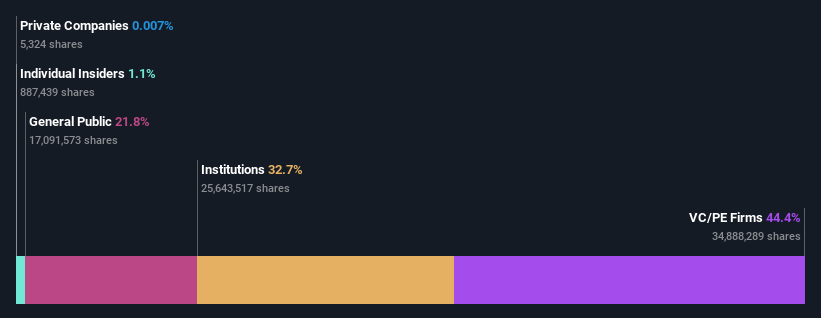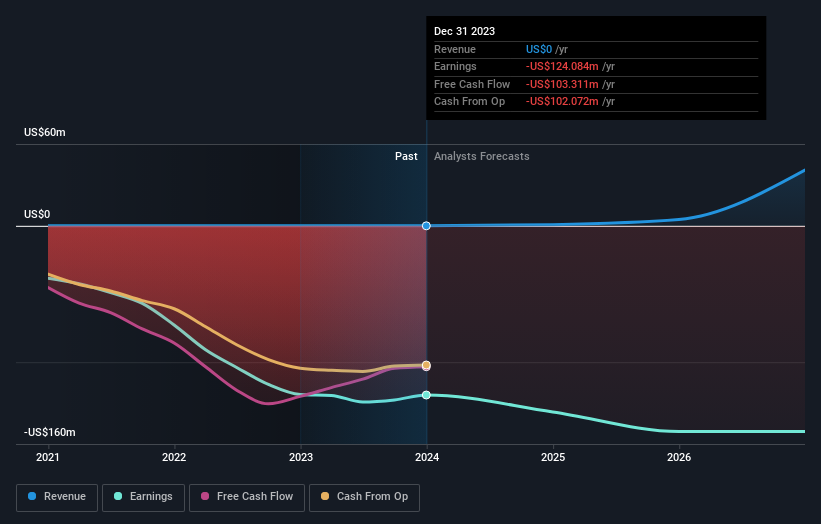Key Insights
-
Tenaya Therapeutics’ significant private equity firms ownership suggests that the key decisions are influenced by shareholders from the larger public
-
A total of 4 investors have a majority stake in the company with 50% ownership
If you want to know who really controls Tenaya Therapeutics, Inc. (NASDAQ:TNYA), then you’ll have to look at the makeup of its share registry. And the group that holds the biggest piece of the pie are private equity firms with 44% ownership. In other words, the group stands to gain the most (or lose the most) from their investment into the company.
Institutions, on the other hand, account for 33% of the company’s stockholders. Insiders often own a large chunk of younger, smaller, companies while huge companies tend to have institutions as shareholders.
Let’s take a closer look to see what the different types of shareholders can tell us about Tenaya Therapeutics.
See our latest analysis for Tenaya Therapeutics
What Does The Institutional Ownership Tell Us About Tenaya Therapeutics?
Institutions typically measure themselves against a benchmark when reporting to their own investors, so they often become more enthusiastic about a stock once it’s included in a major index. We would expect most companies to have some institutions on the register, especially if they are growing.
We can see that Tenaya Therapeutics does have institutional investors; and they hold a good portion of the company’s stock. This implies the analysts working for those institutions have looked at the stock and they like it. But just like anyone else, they could be wrong. When multiple institutions own a stock, there’s always a risk that they are in a ‘crowded trade’. When such a trade goes wrong, multiple parties may compete to sell stock fast. This risk is higher in a company without a history of growth. You can see Tenaya Therapeutics’ historic earnings and revenue below, but keep in mind there’s always more to the story.
Hedge funds don’t have many shares in Tenaya Therapeutics. The Column Group, LLC is currently the largest shareholder, with 29% of shares outstanding. With 8.1% and 7.0% of the shares outstanding respectively, Casdin Capital, LLC and RA Capital Management, L.P. are the second and third largest shareholders.
On looking further, we found that 50% of the shares are owned by the top 4 shareholders. In other words, these shareholders have a meaningful say in the decisions of the company.
While studying institutional ownership for a company can add value to your research, it is also a good practice to research analyst recommendations to get a deeper understand of a stock’s expected performance. Quite a few analysts cover the stock, so you could look into forecast growth quite easily.
Insider Ownership Of Tenaya Therapeutics
The definition of company insiders can be subjective and does vary between jurisdictions. Our data reflects individual insiders, capturing board members at the very least. Company management run the business, but the CEO will answer to the board, even if he or she is a member of it.
Insider ownership is positive when it signals leadership are thinking like the true owners of the company. However, high insider ownership can also give immense power to a small group within the company. This can be negative in some circumstances.
Our most recent data indicates that insiders own some shares in Tenaya Therapeutics, Inc.. It has a market capitalization of just US$350m, and insiders have US$4.0m worth of shares, in their own names. It is good to see some investment by insiders, but it might be worth checking if those insiders have been buying.
General Public Ownership
With a 22% ownership, the general public, mostly comprising of individual investors, have some degree of sway over Tenaya Therapeutics. While this group can’t necessarily call the shots, it can certainly have a real influence on how the company is run.
Private Equity Ownership
Private equity firms hold a 44% stake in Tenaya Therapeutics. This suggests they can be influential in key policy decisions. Sometimes we see private equity stick around for the long term, but generally speaking they have a shorter investment horizon and — as the name suggests — don’t invest in public companies much. After some time they may look to sell and redeploy capital elsewhere.
Next Steps:
I find it very interesting to look at who exactly owns a company. But to truly gain insight, we need to consider other information, too. Be aware that Tenaya Therapeutics is showing 5 warning signs in our investment analysis , and 2 of those shouldn’t be ignored…
But ultimately it is the future, not the past, that will determine how well the owners of this business will do. Therefore we think it advisable to take a look at this free report showing whether analysts are predicting a brighter future.
NB: Figures in this article are calculated using data from the last twelve months, which refer to the 12-month period ending on the last date of the month the financial statement is dated. This may not be consistent with full year annual report figures.
Have feedback on this article? Concerned about the content? Get in touch with us directly. Alternatively, email editorial-team (at) simplywallst.com.
This article by Simply Wall St is general in nature. We provide commentary based on historical data and analyst forecasts only using an unbiased methodology and our articles are not intended to be financial advice. It does not constitute a recommendation to buy or sell any stock, and does not take account of your objectives, or your financial situation. We aim to bring you long-term focused analysis driven by fundamental data. Note that our analysis may not factor in the latest price-sensitive company announcements or qualitative material. Simply Wall St has no position in any stocks mentioned.






